Peter MALONE
Saturday, 18 September 2021 19:21
To Walk With Lions
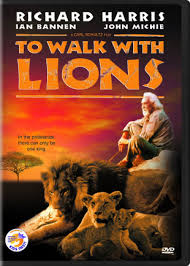
TO WALK WITH LIONS
Britain/Canada, 1999, 106 minutes, Colour.
Richard Harris, John Michie, Kerry Fox, Ian Bannen, Geraldine Chaplin, Honor Blackman.
Directed by Carl Schultz.
To Walk With Lions is an updating of the story of George Adamson. Adamson and his wife Joy were the subject of the very popular film of the '60s, Born Free, and its sequel, Living Free. Joy, by this time, has left George and is travelling around Africa, coming to see him every year. She is murdered in Kenya.
The ageing George Adamson is still training lions to go out into the bush. However, the situation has changed in Kenya and too many groups, herds, poachers are moving through the countryside. Adamson lives with his brother Terence (played by Ian Bannen) and they live as recluses on their property, Karo. A young wanderer, Tony FitzJohn? (played by John Michie) finds himself with a job at Karo and, over the years, despite a great deal of irresponsibility, finds himself the heir to Adamson. However, he and a friend Lucy (Kerry Fox) make the transition from Kenya to Tanzania. Eventually George is killed by renegade soldiers.
Honor Blackman appears briefly as Joy Adamson, Geraldine Chaplin as Victoria, a love for George.
The film makes a number of points about the wildlife in Africa, the responsibilities of government, the cruelty of poachers. Direction is by Carl Schultz, the Australian director of Careful, He Might Hear You.
1. The popularity of the Adamsons' story and the lions in Born Free and Living Free? The updating to the '80s?
2. The African locations, Kenya, Tanzania? The open countryside with the animals roaming? Nairobi, the cities? Karo and the homestead? The musical score?
3. The title and the reference to the lions, to George Adamson, to Tony Fitz John and all those who served the wildlife of Africa? George so identifying with the lions that he talked with them, played with them, in his final moments made their cry?
4. The narrative of Tony Fitz John, wandering around Africa and so many jobs, drinking, fighting, finding himself with Terence Adamson, accepted by George? Going out to the lions but running away when told not to? His joining George in his work, growing admiration for him? Learning, staying? His attraction towards Lucy and her reaction towards him? His drinking, clashes with the authorities, with some of the native peoples? His acceptance by the lion, looking after his own, Barnardo? The threats to Karo, his going to Nairobi, drinking, losing the letter, insulting the government official? George's reaction? Lucy and her suggestion to go to Tanzania, George's rejection of this, Tony's anger, his going to Tanzania and staying? His concern about George, going back to Nairobi, asking for government protection? Driving to the ambush scene and George dead? Burying George, continuing his work in Tanzania?
5. Richard Harris as George Adamson, the patriarchal style? The background of Born Free, freeing the lions? His relationship with Joy? His fondness for her, her visit? Their clashes? His love for Victoria, her return to Karo, being ambushed and his charging to save her as he died? His work with the lions, with Terence? Seeing him in action, his diary, his reaction to Tony, keeping him on, his disappointment at his failure? The government wanting him to move, the changing situations? His being mauled by the lion, always having excuses? Not going, Victoria supporting him? The attack, being left on his own, the final charge and his death? His heritage in Africa?
6. Terence Adamson, eccentric, unmarried, supporting his brother, not empathising with the lions, building the roads, his concern about the elephants, his joy when the pack came, his horror when they were massacred and the tusks taken? His decline and silently dying while George looked at Halley's Comet?
7. Lucy, her studies, present in Africa with the tribes, staying, resisting Tony and her quips against him? Her plan for Tanzania and its rejection? Tony accepting, their relationship, going to Tanzania, setting up the wildlife sanctuary?
8. The government officials and their concern, inability to stop poaching? The poachers, the shootings, the brutality with the elephants? The rangers and their being in the pocket of poachers? The army and their being paid, renegades?
9. The friendship of Max, the clashes with Tony, friendship? He and his wife, the attack?
10. A portrait of Africa in the '70s and '80s? Wildlife and its protection? Government corruption, poaching, the army? A future for African wildlife?
Published in Movie Reviews
Published in
Movie Reviews
Tagged under
Saturday, 18 September 2021 19:21
Truth or Consequences, NM
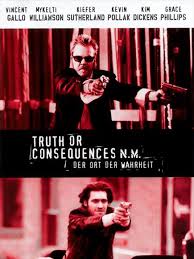
TRUTH OR CONSEQUENCE, NM
USA, 1997, 106 minutes, Colour.
Vincent Gallo, Mykelti Williamson, Kiefer Sutherland, Kim Dickens, Kevin Pollak, Grace Phillips, Rod Steiger, Martin Sheen.
Directed by Kiefer Sutherland.
Truth or Consequence, NM is a latter day Bonnie and Clyde gangster film. It focuses on a group of petty criminals, a robbery going wrong, their escape by car across the American Midwest, culminating in pursuit by the Mob as well as by the police and a deadly shootout.
However, it is a film of the '90s, with Kiefer Sutherland as a psychotic criminal (which he showed he could do in An Eye for an Eye and A Time to Kill). It is also his cinema debut as director (although he directed a number of telemovies).
Vincent Gallo and Kim Dickens are the latter day Bonnie and Clyde, in love, she pregnant, yet criminal background, confronting the Mob, doing drug deals. Kevin Pollak and Grace Phillips are the hostages that the group picks up along the way.
The film is familiar material, classily photographed and strongly directed by Sutherland. Rod Steiger is a Mob chief and Martin Sheen has the opportunity to act the thug.
1. Popularity of American gangster films? The tradition from the '30s? This film as a variation on Bonnie and Clyde?
2. The Midwestern locations, Utah, New Mexico? The open road, the towns, the desert? The range of songs? Musical score?
3. The irony of the title and its being the name of the town where the bloody culmination of the film occurs?
4. The focus on Ray, coming out of prison, high hopes, meeting Addie? Six months later? The plan to do the drug robbery? The collaboration with Curtis and Marcus? The confrontation with Eddie, the mix up, Curtis and his shooting? Taped, videoed?
5. The clash of characters amongst themselves? The decisions what to do? Ray and his leadership, knowing Eddie? Decisions where to go, driving the car? His love for Addie and her going along for the ride? Marcus as part of the gang? Curtis and his psychotic behaviour, not blaming himself, the game, the police the good guys, the gangsters the bad guys and their following the rules?
6. Taking the campervan, Donna and Gordon as hostages? Terror, Gordon gradually liking it, wanting to please the gang, listening to them, aping them? Marcus trying to help them to escape? Gordon spoiling it? Donna realising the truth? Donna and her dismay at Gordon's behaviour? The guns, the fight in the town, Gordon's reflex action, Curtis killing the man but telling Gordon that he had killed him?
7. The travels, the taking of the cars, the driving, the encounter with the police, hiding on the top of the van?
8. Going to the criminals? The irony of their having robbed his drugs? Curtis and the shootout? The pursuit by the gangsters, Sir and his interrogations, catching up with Wayne, interrogating him, torturing him?
9. Going to Wayne's house, cellmate to Ray, imposed upon? Their going to get pizza and the incident with the brutal man? Wayne and his going to his girlfriend's? Coming back, interrogated, tortured and killed?
10. Marcus and his contact with the police, the notes, the phone call and his getting out of it? The police coming in, the confrontation with the Mob, the police, the drug deal and the drug dealers? The deaths?
11. The aftermath American society, the tradition of gangsters and robberies, hopes for freedom, dreams of escaping to Mexico and a happy life? The frustration of the American dream?
Published in Movie Reviews
Published in
Movie Reviews
Tagged under
Saturday, 18 September 2021 19:21
Topsy-Turvey
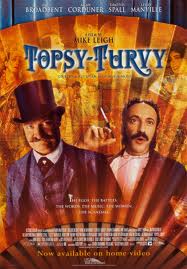
TOPSY-TURVEY
UK, 1999, 159 minutes, Colour.
Jim Broadbent, Allan Corduner, Timothy Spall, Lesley Manville, Ron Cook, Wendy Nottingham, Kevin Mc Kidd, Alison Stedman.
Directed by Mike Leigh.
Topsy-Turvey is a portrait of Gilbert and Sullivan. In the '50s there was a biography with Robert Morley and Maurice Evans, with Peter Finch as D'Oyley Carte. There have been many film versions and television versions of their operettas.
However, this is a film by Mike Leigh, better known for his portraits of suburban England, family clashes and intense portrait and studies of relationships like Life is Sweet, High Hopes, Naked, Career Girls and, especially, his award-winning Secrets and Lies. This is quite a departure for him in terms of contemporary and historical films and theatre and real life. However, while he shows us the operettas and Carl Davis's score incorporates the music, he also gives us a background to the two composers. As with so many more recent biographies, their shortcomings and failures (and even vices) are displayed rather than a hagiographical portrait.
Jim Broadbent is excellent as the humorist Gilbert who lacks a sense of humour, is a touch prudish, especially with his wife, fears the critics and is often cantankerous. (There are portraits of his father and his estranged mother which contributes to this understanding of Gilbert.) Sullivan on the other hand, would have been at home as a 20th century celebrity, living the high life, enjoying his music but willing to indulge himself - and never achieving the ambitions that he had for more serious music.
The film also spends some time in sketching in the characters of the players with their idiosyncrasies. Timothy Spall stands out as Temple and Kevin McKidd? is Lely. Alison Stedman has a cameo role as the costume designer.
However, there is a strength of the film in the presentation of rehearsals, a wide range of sequences which enable audiences to understand the staging of the operettas. Also, there is material showing D'Oyley Carte's daily business operations and contracts. There is a nod in the fascination with inventions at this time of the 19th century, especially the phone, fountain pens (called reservoir pens) and electric doorbells.
1.Audiences and their love for Gilbert and Sullivan? The heritage of the '50s film? The various film and television versions of the operettas?
2.Mike Leigh and his previous work, audience expectations? A Mike Leigh treatment of the 19th century and Gilbert and Sullivan? The staging of the rehearsals and of the operettas (on the stage of the Savoy Theatre)?
3.The title and its reference to Gilbert as the king of Topsy-Turveydom? His antagonism towards the reviewers and his dislike of this title - yet his accepting it and using it? The world of operetta as topsy-turvey - audiences loving this escapism, the prettiness and beauty of the stories, costumes, music? Magic, sorcerers, disguises, revelations? Compared with the real world?
4.Sullivan's music - his hopes to write opera and symphonies, the sequence with the singing of the lost chord? His wanting to have emotion in his music? Carl Davis's score and the incorporation of the operetta music? The staged sequences of Princess Ida and the sorcerer? The focus on The Mikado: the variety of rehearsals and performance, the background to the writing of the music, the range of songs as illustrated by The Mikado? The film ending with "the sun whose rays..."? The final comment about music, Sullivan and his serious aims and his success with popular operettas?
5.The heritage of W.S. Gilbert's words: clever, humorous - but his not having a sense of humour? The patter songs? The verbal wit? The relationship of words to music and the interdependence?
6.The biographical slant and the facts: the focus on 1884-85? The significant year for Sullivan's health and music crisis, the possibility of the collapse of the partnership, the creativity of The Mikado with The Gondoliers and The Yeomen of the Guard to follow? Information about each prior to 1884: the operettas themselves, their success, the D'Oyley Carte Company, Carte and his management, money, the reviews and Gilbert's antagonism, the success of their careers? Gilbert's personal life, his relationship with his wife, calling her Kitty? Their not having children? His father visiting him and his cantankerous attitude towards his cantankerous father? The electric doorbell? The alienation from his mother, the chance meeting of his sisters and their returning to their mother, her not wanting the gift? Sullivan as rakish, his mistresses, abortions, sexual behaviour? Mrs Ronalds and the discussion about cigarettes and smoking... being modern?
7.The crisis of 1884? Sullivan as ill, getting dressed to go to the theatre, the performance, his collapse, the doctor, going to France for a holiday, the brothel and the lewd presentation of Offenbach's music? The women and his affairs? Sullivan as a celebrity? Carte confronting him in the restaurant? His refusal to collaborate? Gilbert and writing a new play, the danger of their repeating themselves? Sullivan's refusal, the meeting with Miss Lenoir trying to mediate? The stalemate?
8.Carte and his astuteness, business acumen, his working with Miss Lenoir, their talking to each of Gilbert and Sullivan, together? Stalemate? Having to go to revivals? Carte and his ambitions, the company, building the hotel, seeing the collaboration as a business? Being modern - the phone in his room, the idea of en suites at the hotel? Travel and the expansion of the English outlook to the Continent, trains and tunnels? The world of contracts? His interviewing of each of his stars and their discussions of salaries, his negotiations, his threats? Rebuking the actress for her drinking? His support for the cast - and his encouragement after the final rehearsal? The work with Barker - and the scene with the phone and ringing Gilbert with the code?
9.The portrait of Gilbert's father, his arrival, talk, Gilbert and his puzzlement, rather abrasive treatment of his father? The absence of his mother?
10.Sullivan and his musical ambitions, the hope with the lost chord, the singing of the song?
11.Gilbert and his being persuaded by his wife to go to the Japanese exhibition, his being intrigued, the detail of the exhibition - plays, the women and their costumes, the martial arts? His buying the sword, getting a servant to hang it on the wall? His moodiness while writing - the falling sword and the origins of The Mikado?
12.The portrait of the players and their characters: George and his pettiness, his ability with the patter songs, discussing his salary, the illness from the oysters, his taking the injections to keep him going during performance? The other singer and the oysters and his illness? Lely and his discussions and his place as the leading tenor and the leading man? Mr Temple and his performance, his skills, quoting Mrs Temple - the Mikado song and Gilbert cutting it, his being devastated? Lely and the fittings, his prudishness about showing his legs? The singer and her drinking, flirting? The other singers - and the fittings for their costumes, the antagonism towards not wearing corsets and Japanese dresses? The dress designer and her handling the situation? The members of the chorus - their being behind Price and the willingness to confront Gilbert about the reinserting of the song - and their success?
13.The use of rehearsals: the men singing and Sullivan tutoring them, the women? The rehearsal of 'Defer to the Lord High Executioner'? The sense of putting on the show, the pep talks and the pointing out of needs for improvement as well as encouragement after the last rehearsal? The performances and their success?
14.Gilbert and his nerves, wandering the streets of 1880s London and their squalor? The end and his wife telling the story of a surreal ambition to have a child and Gilbert obtusely not understanding? The contrast with Sullivan and the discussion with Mrs Ronalds about the abortion and trying to be modern in 1885?
15."The sun whose rays..." as the final song - the Gilbert and Sullivan heritage and gift to the public? Their status as musicians and composers? Their real lives?
Published in Movie Reviews
Published in
Movie Reviews
Tagged under
Saturday, 18 September 2021 19:21
Too Young to Kiss

TOO YOUNG TO KISS
US, 1951, 89 minutes, Black and white.
June Allyson, Van Johnson, Gig Young, Paula Corday, Hans Conried.
Directed by Robert Z.Leonard.
Too Young to Kiss is a pleasant MGM comedy from Francis Goodrich and Albert Hackett, writer of a number of significant MGM films including Summer Holiday. It was directed by veteran Robert Z. Leonard (Pride and Prejudice). It was one of the many romantic teamings of Van Johnson and June Allyson, a popular pair. Gig Young is in the `other man' role.
A pleasant comedy - very similar to Billy Wilder's The Major and the Minor where Ginger Rogers pretended she was a young teenager. June Allyson has little trouble in doing the same - deceiving Van Johnson.
1.Entertaining comedy? The stars? Of its period?
2.Black and white photography? The city? The concerts? The country estate? The musical score? The use of the classics, especially Chopin?
3.The title, romance, the age gap? Cynthia Potter, her musical accomplishment, inability to get an audition, her attempts? Her relationship with John, the hope of an engagement? Hearing about the child auditions? Dressing up as Molly, going to the auditions, her playing, success? Caught and having to go along with the pretence? As Cynthia, antagonistic towards Wainwright? Her responses to him as Molly? The concerts, the hype? Going to his country estate, the nice housekeeper? Her tantrums as a child? Outings, food, games? Ringing Cynthia? Cynthia and her phone calls to Wainwright? John and his expose? Her angers, the build-up to the concert? The revelation? Her playing the concert, her success? Wainwright and his change of heart? The happy ending?
4.Van Johnson as Wainwright, the entrepreneur, listening to the auditions? Denise and the other artists and keeping them happy? Attracted by Molly, the antagonism towards Cynthia? The double meetings and phone calls? ..... tantrums? His forgiving her? Her performance, his discovery, his humiliation, admitting the truth? The reconciliation?
5.John, in love with Cynthia, his job, skill as a writer, the scoop, the plan with Cynthia, the publication?
6.The housekeeper, her eye on Molly, seeing the two were in love, her support?
7.Denise and the temperamental artistes? Humour?
8 The battle of the sexes? Age differences? Tongue-in-cheek? Plausible.
Published in Movie Reviews
Published in
Movie Reviews
Tagged under
Saturday, 18 September 2021 19:21
Too Outrageous
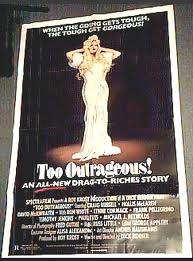
TOO OUTRAGEOUS
Canada, 1987, 100 minutes, Colour.
Craig Russell, Hollis Mc Laren.
Directed by Richard Benner.
Too Outrageous is a Canadian production, written and directed by Dick Benner. Benner directed a very successful comedy, Outrageous, in the mid-'70s. This is a mid-'80s sequel.
The films were star vehicles for female impersonator Craig Russell. His repertoire includes the expected: Mae West, Judy Garland, Barbra Streisand, Carol Channing... Russell, in this second film, is rather chubby and his performances, to that extent, lack some credibility. His voice and manner of the stars is more persuasive.
The film takes up the story of Robin Turner, an impersonator, successful in clubs but having the opportunity to go into the big time. There are the usual Star is Born variations on the theme, including the personality of his friend, Lisa, a writer who has spent some time in a mental institution. There is his manager, musical director - as well as the ambitious New York agent and the hustler that she employs to keep Robin company and to build up his ego.
The film offers familiar material and relies on its success for the screen presence of the cast, the camp impersonations of the stars, the atmosphere of camp clubs - and the film is a bit more explicit about homosexual relationships in the '80s and also focuses on the advent of AIDS and deaths from AIDS.
1.Entertaining comedy? Variation on A Star Is Born? Female impersonators? Their world? Show business?
2.The New York and Canadian settings? The cities, apartments, offices, clubs? The musical score - and the range of songs for the impersonator?
3.The title and its original focus? The sequel? Robin Turner and his impersonations as outrageous, the world of the clubs as outrageous?
4.Craig Russell and his skills? As actor, as impersonator? The range of performances? His friendship with Lisa, their mutual love and help? His agent and support? Comebacks? Ups and downs in career? The performance for the agent, the interviews and the opening up of possibilities for film and television, video? Contracts? Robin and his moodiness, drinking, sardonic attitudes? The need for ego support? The encounter with Tony, the affair, performing together? The break-up when Tony was rejected from the performance? Hearing the truth from Tony? Lisa and her friendship with Manuel, Robin and his feeling isolated? Betty and her pressures? Irresponsible as regards rehearsals, performance? Feeling alienated, Tony leaving him, his agent telling him the truth about AIDS, love and friendship and his tantrums? The final song? Reunited with friends - and a different future?
5.Camp themes, homosexual relationships, hustlers? The reality of AIDS in the '80s and its destructiveness, illness and death?
6.Lisa, her background, mental breakdown? Her stories? Wanting to get published? Friendship with Robin, companion? His performances and her support? Her meeting Manuel, the affair? His superstitions and religion? Falling out with him? Her collapse, the institution, Robin masquerading as her mother to get her out? Her wanting to stand on her own feet? Betty and the publication of the stories? Alienated from Robin, the agent persuading her to support him? Hearing her final song? Reunited?
7.The agent and the musical arranger, their relationship between themselves, with Robin? Agent work, getting performances? The New York contact? Robin and his career, failure? The music director's death? The agent and his strong talking with Robin and making him face reality?
8.Tony, the hustler, relating with Robin, the song and dance routines? Rejected from performance? The brutality of his ending the relationship? His weeping privately?
9.Betty, the New York agents, ambitions? Her wanting to make her way? Contracts, pressure, rehearsals and training? Performances for backers? Her hiring Tony? Her being unmasked? Her devotion to Robin - future?
10.The world of impersonators, clubs? The patrons at the bars? The bartenders? Entering into performances? The world of agents and backers?
11.Comedy, serious? Not seeming so outrageous in the 1980s?
Published in Movie Reviews
Published in
Movie Reviews
Tagged under
Saturday, 18 September 2021 19:21
Tom and Viv
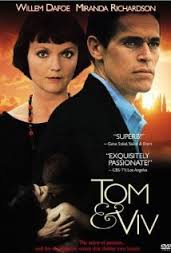
TOM AND VIV
UK, 1994, 125 minutes, Colour.
Willem Dafoe, Miranda Richardson, Rosemary Harris.
Directed by Brian Gilbert.
Michael Hastings' play on poet T.S. Eliot and his first wife, Vivienne Haigh- Wood, has been opened up for the screen, taking audiences back into an England somewhat reminiscent of C.S. Lewis and Shadowlands. However, there is more bitterness here and Eliot does not emerge as a man one admires. Willem Dafoe portrays him as an eccentric American expatriate who wants to be more British than British (and his strange accent actually mimics Eliot's accent), a rather 'ingrown' character, prim though creative.
Miranda Richardson gives a complex performance that brings out the vivacity, the physical and mental torment that she experienced in her mad love for Eliot. The film is really her film and audience sympathy is hers.
The background of the period (from World War One to World War Two) is an asset. One won't discover a great deal about Eliot the poet, dramatist or academic, but audiences will be fascinated by this unlikely marriage, a famed poet and some wastelands of his marriage.
1.Interesting British drama? Re-creation of period, literary background, British history?
2.Panavision photography, London, the English countryside? The period from 1918 to the mid-'40s? The musical score?
3.The title and its focus, its tone? Adaptation from stage play?
4.The perspective of the screenplay, for Tom, for Viv? The critique of each? Where did audience sympathies lie by the end of the film?
5.The personal portrait of T.S. Eliot and Vivien? The allusions to the poetry and the quotations, to Eliot's academic life, to his editing work at Faber and Faber, to his religious conversion and its meaning, to his role as a significant British poet, the work in the media, especially during World War Two?
6.Willem Dafoe's screen presence and style as Eliot? Appearance, mannerisms, accent? Eliot and his British respectability, his American background and relations, in England and wanting to be very British? The initial lecture, his friendship with Bertrand Russell, the attraction towards Vivien, rowing and the picnic, her sexual reticence? The elopement? The friendship with Maurice and Maurice's questions? The wedding night, his disgust, leaving the room, standing looking out on the water? His return and the chaos and his handling of the situation? A gentleman? His vow of love to Vivien, his love for her? The interrogation by her parents, the critique of the father, the support of the mother? The help from Bertrand Russell, the flat, his publication of his poetry, the prospect of lectures?
7.Miranda Richardson's screen presence and style as Vivien, her verve, the initial performance outside the lecture window, her love for Tom Eliot, her relationship with her mother, the elopement, the experience of the first night, her depression, her illness and the frequent menstruation, the physical and psychological effect? Her reaction at dinner and the talk of passivism? The explanations of her illness, the doctor and the information, her being shielded? Her love for Eliot, sharing in his work, in his poetry, her contribution to the poetry and the naming of the wasteland?
8.Maurice as a genial British young man, sense of family, decorum? Love for his sister, caution about her wedding? His own sexual experiences and lack of them? Going to the war, his survival? No work, the decision to go to Africa? His return, Vivien crashing the car? His participation in her committal? After the war, the only visitor she had, his appreciation of her, his grief, taking the chocolate cake for Eliot?
9.Vivien's mother, her knowledge of her daughter, control, love, not telling her the full truth? The reaction to the wedding, welcoming Eliot? Her attitude towards British society, British breeding, towards poetry? Her despising of the Bloomsbury Group? Her husband, the job for Eliot, his death? The discussion about the will, Maurice and Eliot becoming trustees, their power over Vivien? Her decisions about her daughter, her being present at the interrogation and agreeing to the committal? Packing her daughter's clothes - and her rebuke for Eliot?
10.The brief portrait of Bertrand Russell, friendship, giving the flat, taking Vivien to the sea, her collapse, the telegram, the background of the affair, meeting Eliot during the war and Eliot rebuking him?
11.Eliot and his work, the need for money, his going to the bank - and being absorbed into the bank culture? His appearance, his desk, glasses, manner of speaking? Vivien's reaction and her throwing his clothes out the window? The visit to the Bloomsbury Society, the playing of games, Eliot and his wanting to win, make a good appearance, not wanting to win by cheating - but getting the answer from Vivien? His interest in the church, the visit of the bishop and his ousting Vivien?
12.Vivien and her ups and downs, her friendship with Louise - visiting her and getting great support? Her personal behaviour and tantrums? Her admiration for Eliot and his poetry? Her reaction to her father's will, wanting the house, the car, putting on a turn? Faber and Faber, ringing the secretary, pouring the chocolate through the door? Her collapse and the bishop's arrival? Crashing the car with Maurice and Eliot? Her family having more information (and the audience knowing this) and relationship between her physical and mental illness?
13.Eliot and the Anglo-Catholic? church, instruction, the solemnity of the baptism, the cross-cutting with her banging on the door? His becoming a British citizen, the possibility of lectureship at Harvard?
14.The glimpse of the Bloomsbury set, Virginia Woolf and the others? Their literary background, society, attraction towards Eliot, lionising him?
15.The doctors and the discussion of Vivien's illness, her mother's reaction, the final situation and her locking herself in, the test and her failure (deliberate or not?), her being taken in the teashop with Louise, the sadness and the melodrama, her choosing to create a scene?
16.The many years in the institution, the quiet tranquillity, her health after menopause? The visit of the American and his wanting to help her, his ignorance of Eliot and her reaction? Her paying for her own welfare, Maurice's visit and the pathos of nobody going to see her, her polite asking after everyone, her love for him? Eliot not having visited her for 10 years? Listening to him on the BBC? The pathos of her death?
17.Eliot and his continuing to work and write, the range of poetry, his comments on poetry not expressing emotion but as an escape from emotion, broadcast during the war, the symbolism of the lift and his continually going down, his being enclosed?
18.A portrait of Britain in the first part of the 20th century, society, ambition and success, art and the reality of life?
Published in Movie Reviews
Published in
Movie Reviews
Tagged under
Saturday, 18 September 2021 19:21
To Catch a Killer
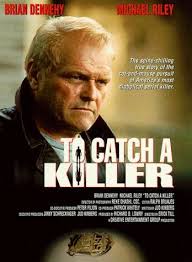
TO CATCH A KILLER
US, 1992, 135 minutes, Colour.
Brian Dennehy, Michael Riley, Margot Kidder, Meg Foster, Scott Hylands.
Directed by Eric Till.
To Catch a Killer is based on the investigation into the serial killer John Gacy. The film is in many ways a case study and the film at the end says that the methods used for the investigation have become texts for trainees a study in a work of painstaking detection and the building up of sufficient evidence to bring a prosecution.
John Gacy, portrayed by Brian Dennehy with some intensity, especially towards the latter part of the film, murdered over thirty young men and buried their bodies. He also abused them sexually. Though he had a criminal record, he became a respected member of the community as a construction manager. He also taught Sunday School and was on many committees for society.
The film focuses on the disappearance of a young man, the concern of his parents, the investigation by Joe Kosenczak and his driving his team of investigators until he got absolute proof against Gacy. The group used certain harassment techniques to put Gacy off guard. However, he maintained his innocence and played himself against the police, even picking up a young man and taking him to his home. However, he ultimately collapsed and evidence was found of the corpses buried under his house. The film also shows the use of a psychic, played by Margot Kidder.
The film is not a psychological case study of Gacy, though Dennehy gives his interpretation sufficient grounds for audiences to try to understand the mad mentality of such a killer.
Direction is by Eric Till, Canadian director who made such films as Hot Millions and telemovies over a quarter of a century, including Mary and Joseph.
1. A telemovie: case in detection work, detailed police work, preparation for a prosecution case, gathering evidence?
2. The film as a case study of John Gacy in the context of his society, crimes, psychology, investigation by the police? Sufficient material in the film to understand his psychological profile?
3. The title and its emphasis on the work of detection?
4. The Illinois settings, the town, the seasons? Homes? Police precincts? The surveillance work on Gacy, outside his home, the bars, at work, his home? Musical score?
5. Gacy and his place amongst American serial killers: his character, position in society, prison sentence, charges of sodomy, release, attitudes of the police and their helplessness, his working with young boys and offering them better wages, the abuse, the killings, burials? His lies? The latter sequence of his picking up Billy and taking him to his home to play pool and the effect on the young man? This scene (seen??) at the end of the film to give audiences some idea of Gacy's approach? Kozlo and his working with Gacy, buying the car, helping bury the bodies by digging the graves?
6. Kozlo and the police, the interrogations, his gradually revealing the truth, pressure on him? Gacy's pressure?
7. The use of the psychic, her experience, what she saw, the diagrams? Contribution? Police scepticism?
8. The legal officer and her scepticism, wanting a sound case, being offhand in her treatment but finally confronted by Kosenczak and his giving her the evidence? The permission for home searches?
9. The young man and his birthday gift for his mother, his girlfriend, wanting the new job, his disappearance? His parents' concern and their collaboration? The ticket for the developing of the films? His not being amongst the bodies? Kosenczak's later finding him as a finish to the promise to his parents?
10. The range of police, personalities, collaboration, clashes? Surveillance and its demands? Ringing Gacy, watching him, driving him, the car chase on the freeway? Ross and his meeting him in the bar, disturbing him, seeming a friend? The two men going into the house to get the number of the television set? The greater collaboration amongst the group, the interrogations, the research and its detail? The other names, the parents, the interview with the Slavic sounding surnamed man and his feeling that he'd been ignored?
11. America and serial killings, part of the social background, psychological disturbance? The role of the police and of justice?
Published in Movie Reviews
Published in
Movie Reviews
Tagged under
Saturday, 18 September 2021 19:21
Time to Triumph, A
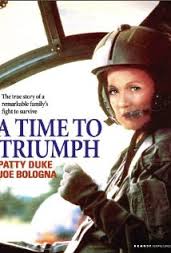
A TIME TO TRIUMPH
US, 1986, 100 minutes, Colour.
Patty Duke, Joe Bologna, Julie Bovasso.
Directed by Noel Black.
A Time for Triumph is based on a true story. It focuses on the contemporary family, the heart attack of the father, his inability to hold down his building construction job, the decision of his wife to join the army for a house and medical benefits, her education, decision to train to be a helicopter pilot, the husband's decision to look after the family. It highlights the tensions within the family, the attack on the traditional understanding of the head of the household and the provider.
Patty Duke, a regular in so many telemovies, is the wife who is transformed by the possibility of a career. Joe Bologna is persuasive as her husband. The film highlights the life in the army in the expected way (the mixture of An Officer and a Gentleman and Private Benjamin). The scenes for the husband taking care of the children have a touch of Mr Mom.
The film is enthusiastic and earnest in its presentation of the family, their struggles - and their triumph.
1.Interesting and entertaining American telemovie? Contemporary issues? For the wide television audience?
2.America, the suburbs, army and air force bases? The musical score?
3.The title, the focus on the family, on Connie and Chuck and their transformation? Their future?
4.The presentation of the American family, the opening with Connie reminiscing, the baptism of the child? The three children, Connie's memories of her Catholic upbringing and her expectations about life, happiness and hardship? Chuck, his job? His heart attack and the repercussions? Connie's supporting him? His irritation? The decision to change roles - struggles, success?
5.Connie, wife and mother, her expectations in life as a housewife and mother? Her Catholic upbringing? Training of the children? Her response to Chuck, his illness? Support, bearing with his irritation? Her attempts to get a job, cash register, fearful of men prowling outside the shop? The employment agency, the discussion about the army? Testing, recruitment? Chuck and his reactions, anger? His giving in? Her leaving home, the initiation into the army, the drill, the routines, the authoritarianism? Her helping Rae? Her having to run the two miles, phone call to Chuck? Her success, graduation? The years passing, her efficiency? Her relationship with the children, their squabbling, their relating to their father? The decision to train as a helicopter pilot? The decisions, away from home? The clashes within the family? Her training, hopes, the young man who failed the test? Her solo flight, support from the co-pilot? The family turning up, sharing in her triumph? Portrait of a contemporary woman, situations changing, realising her potential?
6.Chuck, supporting the family, construction work, one of the boys? The heart attack, his acceptance, non-acceptance? At home, idle? Not wanting Connie to get a job? Her proposal to join the army and his reaction? His looking after the children, mishaps, becoming good at it? Stern treatment of the girls and their discipline? His not being able to do anything for himself? The crisis, the helicopter training, his giving in, moving home? Revisiting his friends - the drink, their jibes at him? His standing up for his wife, realisation that he was proud of his ability to look after his family? Support of Connie?
7.The children, at home, the situation, thinking that adults could do what they liked? The poorer home? The army, pride in their mother, yet squabbles, housework, changing homes, truancy from school? Their final support?
8.Chuck's mother, her support of the family, concern?
9.The fellow workers, the tough builders and constructors? Chuck and his return and inability to climb the ladder? His confrontation with them and standing up for himself and his wife?
10.The army, the drill sergeant and her toughness? Training, discipline? Helicopter training?
11.A story of positive human values? People overcoming crises - and discovering more about themselves and giving it to others?
Published in Movie Reviews
Published in
Movie Reviews
Tagged under
Saturday, 18 September 2021 19:21
Tidal Wave No Escape
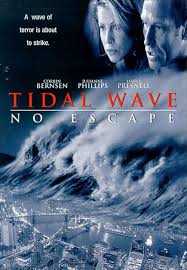
TIDAL WAVE NO ESCAPE
US, 1997, 95 minutes, Colour.
Corbin Bernsen, Julie Anne Philips, Gregg Henry, Harve Presnell.
Directed by George Miller.
Tidal Wave No Escape is a routine telemovie, combining political conspiracy theories, nuclear conspiracies, ecological disasters and disaster movies. It all works quite well for a relaxing Saturday night at the movies.
Corbin Bernsen is a burnt-out scientist who is brought back when tidal waves start destroying parts of the Pacific Ocean coasts. Julie Anne Philips is a top scientist, Gregg Henry is also a scientist, who had betrayed Bernsen with his wife. Harve Presnell is the veteran who turns out to be the villain, manufacturing tidal waves for revenge and power.
Direction is by George Miller, director of The Man from Snowy River, Cool Change, Gross Misconduct as well as American telemovies.
1. Entertaining telemovie? Combination of conspiracies and disasters, ecology and nuclear fears?
2. The American locations, the scientific apparatus and laboratories? Computer controls? The visual effects for the tidal waves, especially their crashing onto the land, crashing into the Queen Mary, crashing into each other?
3. The plausibility of the plot: scientific advancements, science for military purposes, rogue scientists and their jealousies and lusts for power?
4. John and his escaping from his work, the set-up of attacking the Under-Secretary? Surfing? Found, brought to the discussions, his abrasiveness with Persell? The clash with Jessica? His leaving - and then under suspicion? His research, the dangers, the pursuit by Stanley Schiff? The set-ups on the Queen Mary, the shootings? The murders in the laboratory? His home destroyed? With Jessica, their relationship? Tracking down Schiff, the split-second timing for turning the waves against each other?
5. Jessica, science, her divorce, brittle, clash with John, suspicions, his visiting her, believing him? Collaboration, on the run? The threats? The finale?
6. Persell, the background of his relationship with John? Jealousy, obsessive? His assistant? His being shot at, killed by Schiff in the hospital? Persell and his having to give in to the truth?
7. Schiff, his background, friendliness, out fishing, the revelation that he was the villain, his jealousy of John, manufacturing the waves, the final confrontation?
8. The spectacle of the tidal waves and their disaster - audiences enjoying being scared, asking what if? The critique of human fallibility, especially in scientists?
Published in Movie Reviews
Published in
Movie Reviews
Tagged under
Saturday, 18 September 2021 19:21
Thursday's Child

THURSDAY'S CHILD
US, 1983, 100 minutes, Colour.
Gena Rowlands, Don Murray, Jessica Walter, Rob Lowe.
Directed by Robert Lowell Rich.
Thursday's Child is a better than average story of a terminal illness. However, it has a happy ending since it deals with heart transplants.
The film is directed by David Lowell Rich, a veteran of many movies and telemovies. It has a particularly strong cast with Gena Rowlands and Don Murray as the parents, Jessica Walter as Rowlands' sister and the film introduces Rob Lowe as the terminally ill son. It was a particularly good role for him to begin his career.
The film is familiar in its treatment of family life, a serious illness, its effect on the whole family, the hospital and medical aspects of illness. However, it transcends the expected with the strength of its performances and its sense of hope.
1.Entertaining telemovie? Family, illness, stress? Heart transplants? Surgery, recuperation? Hope? Designed for the wide television audience?
2.New England settings, home, school? California and the hospitals? The American atmosphere? Musical score?
3.The strong cast, the strong dialogue? The tradition of American telemovies and dramatisations of illnesses?
4.The title, the theme of hope, Thursday's Child has far to go.
5.The portrait of the family, Vicki and Parker, the long marriage, the family reunion? The arrival of the children? Vicki at home, her strong personality? Parker and his business? The interaction of the family, enjoying one another's company? Sam in the context of his family?
6.The portrait of Vicki, motherly, smothering? Strong, nervy, prone to breakdown? Her control of the family? Her outbursts? Non-acceptance of the illness? Pampering her son? Devotion in hospital? The harsh reactions with the doctors? The hopes for the transplant? The visits to California, her anger at Christmas, transformed? Joy, struggling with Sam? The new lease of life? The contrast with Parker, strong, a man of action, calling the doctors (and overstepping the mark by calling the doctor at home)? Support of his wife, balancing her? His concern about his children? In California, the loneliness at home? Questioning God, prayer, asking why?
7.Rob Lowe as Sam, the athlete, joking at home, popular at school? Driving the car, the lack of energy, climbing the mountain, dancing? The collapse? The examinations, the time in hospital, heart disease? Going back to school, collapsing? His trying to bear with his disease? The range of tests, the truth, knowing how long he could live? His getting used to it? The possibility of the transplant? To California, in the motel? Waiting? The physical tests, psychological tests? In readiness, the operation? Success, the rejection symptoms, treatment? Pain? His relationship with his brothers and sisters? With his parents, not wanting his mother to smother him? His birthday, phone calls? Christmas? The success of the operation? The other patients, the little boy and his helping him? The return home, his physical activity?
8.Vicki's sister, her telling the truth, supporting the family, wise?
9.The background of school, the teachers, the friends and their help? The doctors, opinions, tests, possibilities? Consultations? The pressure from parents? The surgery and its success? Responding to emergencies?
10.The girlfriend of the donor, coming to the hospital, the encounter with Vicki, learning what Sam was like? Her sadness and grief, contented to hear about Sam?
11.The ending, the short years of success - yet the possibility of enjoying life for a little longer? The development of heart transplants during the '80s - and giving hope to people? The atmosphere of hope of the movie?
Published in Movie Reviews
Published in
Movie Reviews
Tagged under